Cheat Meals for Boxers

Cheat meals are becoming increasingly popular in boxing and sports that require athletes to make weight or lose weight to improve their physique.
And some think that a cheat meal can aid weight loss.
You might have heard people talk about cheat meals and mention terms like, ‘save metabolism’, ‘upregulate hormones’ and ‘increase fullness and appearance’ with the latter associated with physique sports.
This article will summarise the evidence on cheat meals and ‘refeeding’ and whether boxers and combat sports athletes should consume ‘cheat meals’ when dieting.
Introduction, what is a cheat meal and refeed?
A cheat meal is a non-healthy off-meal plan meal that is high in energy, carbohydrates, and fat with a minimal intake of fruit and vegetables, strictly we could classify it as junk food. Pilia et al. (2016) conducted a thematic content analysis of cheat meal images found on social media. Their analysis revealed that cheat meals contained very large quantities of calorie-dense foods that were related to binge eating episodes where people let go of dietary control. Not surprisingly, over 54% of the 600 images analysed would qualify as an objective binge eating episode (> 3000 kcal).
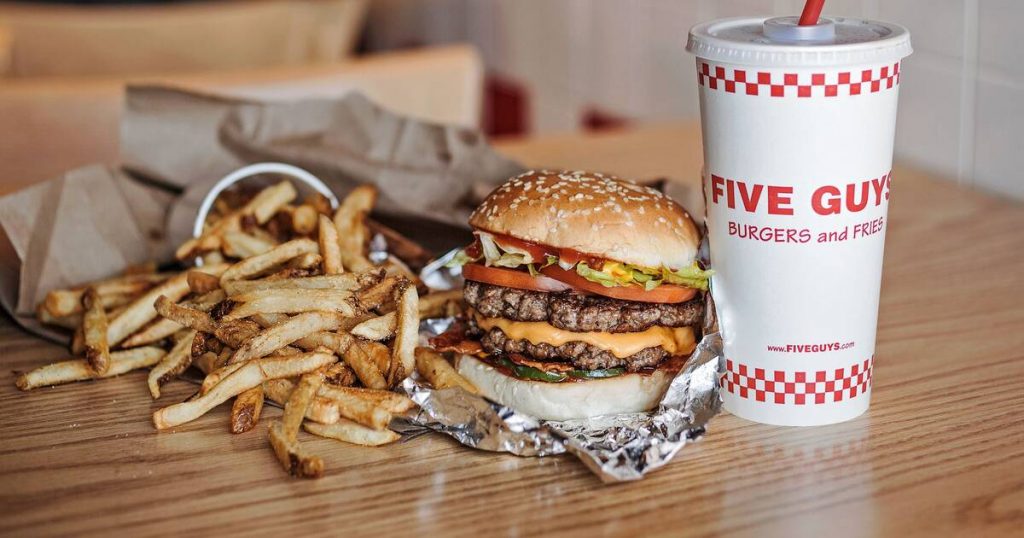
Refeeds are also closely related to cheat meals. Refeeds are often classified as an increased carbohydrate intake for at least 1 day (or sometimes longer) from high carbohydrate and energy-dense sources compared to dieting food sources.
Why do people look for a cheat meal during dieting? Some reasons could be that they offer a mental break from dieting as well as providing an energy boost for training (Peos et al. 2019).
Why use cheat meals/ refeeds?
Many boxers, combat sport and physique athletes must undertake chronic calorie restrictions to make weight. A range of adaptive metabolic, behavioural and endocrinological responses can make continued weight loss difficult following continuous energy restriction. (Campbell et al. 2020).
Metabolic responses to fat loss and energy restriction involve downregulation of total daily energy expenditure. Changes in resting metabolic rate have been studied most in the physique athlete population. Metabolic rates of physique athletes which have been tracked during dieting have shown to be reduced on average by 18% (ranging from 9-47%) (Escalante et al. 2020).
Two appetite-regulating hormones leptin and ghrelin have been shown to alter during weight loss. Leptin is a hormone largely synthesised in adipocytes and responds to energy availability, such that low levels increase appetite while high concentrations create the opposite effect. Previous research has shown that leptin is reduced by 54% after 1 week of dieting in healthy women (Kiem, Stern and Havel, 1998) and by 44% in healthy men following 3 weeks at 50% reduced energy intake (Muller et al. 2015).
Opposition to leptin, ghrelin an orexigenic hormone reflects acute and chronic feeding states by increasing the drive to eat during periods of low energy intake. Ghrelin plays an important role in regulating hunger and meal initiation (Gil-Campos et al. 2006). Lower leptin and higher ghrelin appear to oppose fat mass loss by altering behavioural adaptations such as increasing appetite.
Previous research has documented that muscle protein synthesis is reduced by 27% after only 5 days of dieting (Roberts et al. 2020). Furthermore, testosterone and insulin have been shown to decline during dieting which negatively affects muscle protein synthesis and positively affects muscle protein breakdown (Rooyackers and Nair 1997).
A recent case study of a male combat sport athlete by Langan-Evans et al. (2021) reported that testosterone was significantly reduced as well as RMR (-257 kcal) following 5 days of reduced energy intake (1200-1300 kcal <20kcal per kg of lean body mass). Please see figure 2 below for adaptive responses in the endocrine system during energy restriction from Peos et al. (2019).
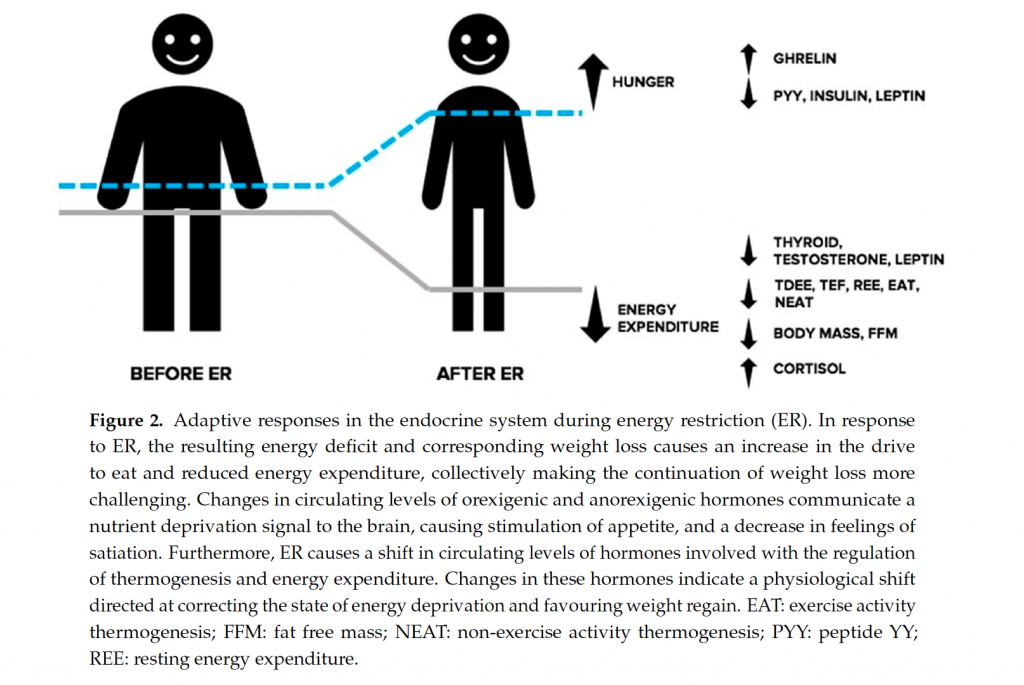
Many weight making and physique athletes are incorporating cheat meals/refeeds to offset these reported negative metabolic, behavioural and endocrinological responses. However, do cheat meals/refeeds reverse these negative effects?
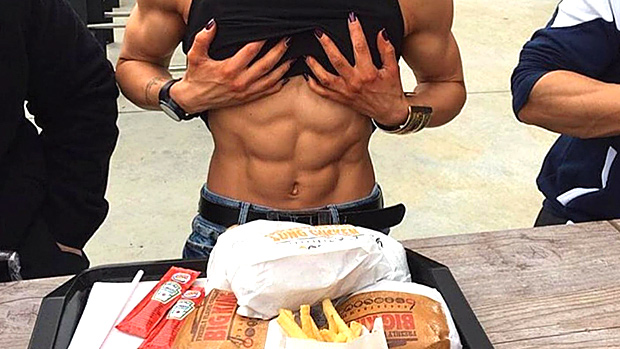
A study by Dirlewanger et al. (2000) investigated the effects of short term (3 days) carbohydrate or fat overfeeding on energy expenditure and plasma leptin concentrations in 10 healthy but not lean (as stated in the study) females (27.2 ± 1.4% body fat). On separate occasions, the females were given a 40% excess energy diet as carbohydrates or fat. Compared to an isoenergetic diet, carbohydrate feeding led to a 28% increase in plasma leptin concentrations (See table 3 from Dirlewanger et al. 2000 below) . In addition, 24-hour energy expenditure was increased by 7% after carbohydrate feeding compared to isoenergetic conditions. Fat overfeeding did not significantly affect any of the biomarkers.
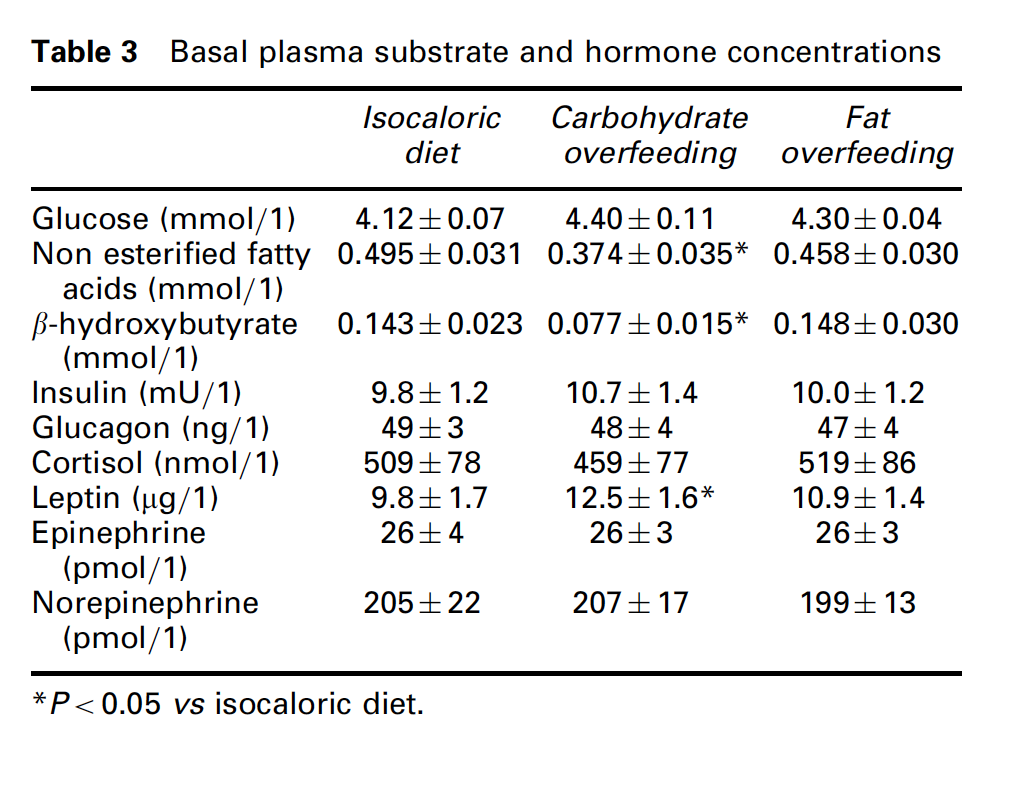
Caution must be taken from this study for a weight making athlete. Consuming 40% excess of energy for 3 days followed by only a 7% increase in 24-hour expenditure is not likely to be helpful for fat loss and would likely create disturbances to the weight-loss plan. See below figure 2 by Dirlewanger et al. (2000) showing 24 hour energy expenditure (24h-EE), basal energy expenditure (BEE), supra basal energy expenditure (supra basal EE) and thermic effect of exercise (TEE) following isocaloric, carbohydrate and fat overfeeding.
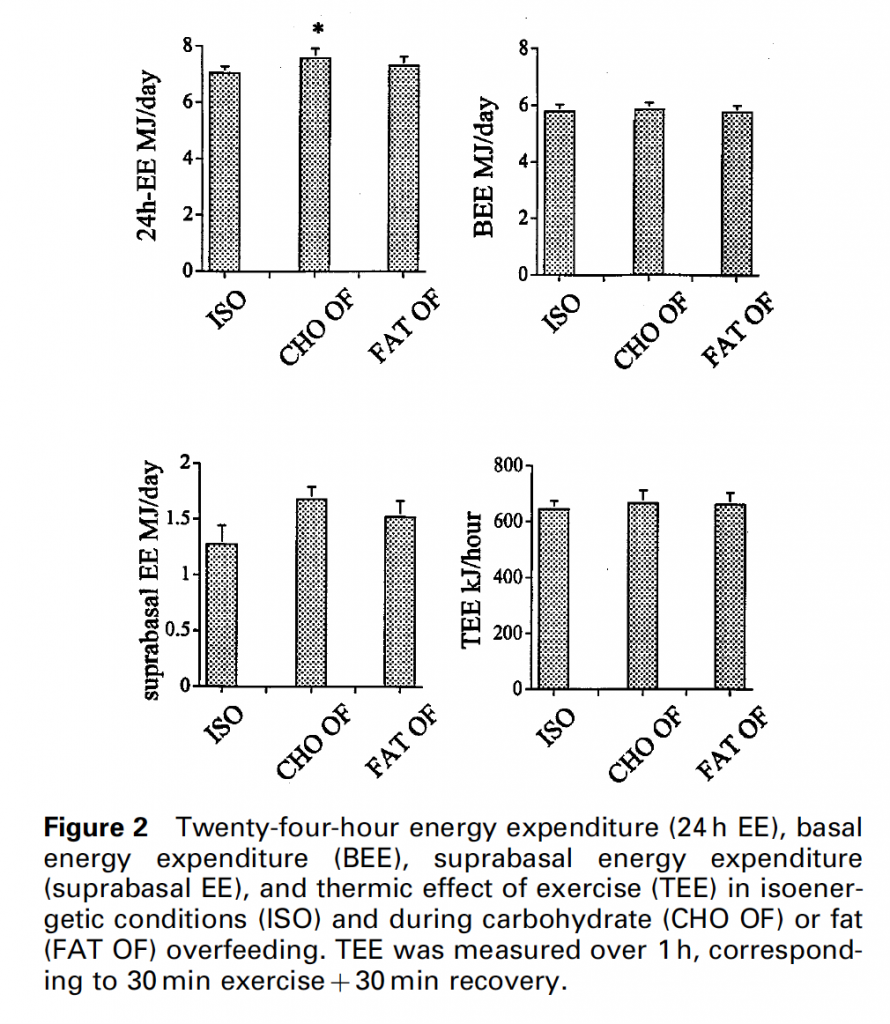
Davoodi et al. (2014) examined the effects of a calorie shifting diet (11-day low calories 3-day higher calories) vs a linear calorie restriction diet in 74 obese females. Following the dieting period of 42 days, the authors found that calorie shifting diet group decreased weight loss by 6.7 kg compared to 5.3 kg in the calorie restriction group. Body fat was reduced by -4.9 kg in the calorie shifting diet group compared to -4.1 kg in the calorie restriction group. More interestingly, weight regain at 70 days was significantly less for the calorie shifting diet (+0.9 kg) vs calorie restriction diet (+2.2 kg). Furthermore, the percentage of participants who withdrew from the study was 36.8% in the calorie restriction group and 15.7% in the calorie shifting diet group. Confirming that the tolerability of the treatment and adherence to the diet was greater for participants in the calorie shifting diet.
Campbell and colleagues (2020) investigated the effects of 7 weeks of continuous dieting or an intermittent restriction of 2-day carbohydrate refeed per week for 7 weeks. 27 (14 male and 13 female) participants completed the study. The continuous dieting group reduced their calories by 25% compared to baseline, whereas the refeed group reduced their calories by 35% for 5 days and 0% for 2 days.
The results showed that the refeed group had a higher fat mass reduction at 7 weeks compared to continuous dieting as well as reduced fat free mass loss. Moreover, RMR was greater in the refeed group compared to the continuous group. However, plasma Leptin was reduced in both groups following the dieting period and given this finding the authors concluded that the protection of RMR was better explained by retention of FFM as opposed to the 2-day carbohydrate refeed employed.
Moura et al. (2021) aimed to assess the effects of a carbohydrate refeed following 4 weeks of moderate (<40% habitual intake) or severe energy restriction (>40% of habitual intake) following German volume training in 11 male bodybuilders. During each week of the study, participants consumed the allocated energy-restricted diet for 5 days followed by 2 days of carbohydrate refeeding.
The study assessed German volume training ‘performance’ as well as perceptual and affective responses and body composition. The results showed that the severe energy restriction group with refeed on average lost more fat mass (2.1 kg) and less fat-free mass (0.7 kg) compared to moderate energy restriction with no refeed (1.6kg fat mass and 1.6kg fat-free mass) whilst reporting less muscle soreness at 24, 48 and 72 hours post-exercise. Moreover, the severe energy restriction group had reduced affective responses (feelings of happiness and motivation to train) pre-refeed compared to the moderate energy restriction group. However, post-refeed this trend was reversed. Finally, the refeed had no effects on performance during the training program compared to moderate energy restriction.
Peos et al. (2021) investigated the effect of a 1-week diet break on calculated weight maintenance targets with 400 kcals coming from carbohydrate sources, on muscular performance in adult athletes following 12 weeks of previous dieting. 26 participants including 11 females completed the study. The study found that the 1-week diet break had no significant effect on fat mass (15.2 kg vs 15.1 kg), strength and power performance, fasting leptin and testosterone. But, the diet break did significantly reduce hunger and irritability whilst improving muscle leg endurance in the quadriceps and hamstrings but not in the biceps and triceps (see figure 2 below from Peos et al. 2021).
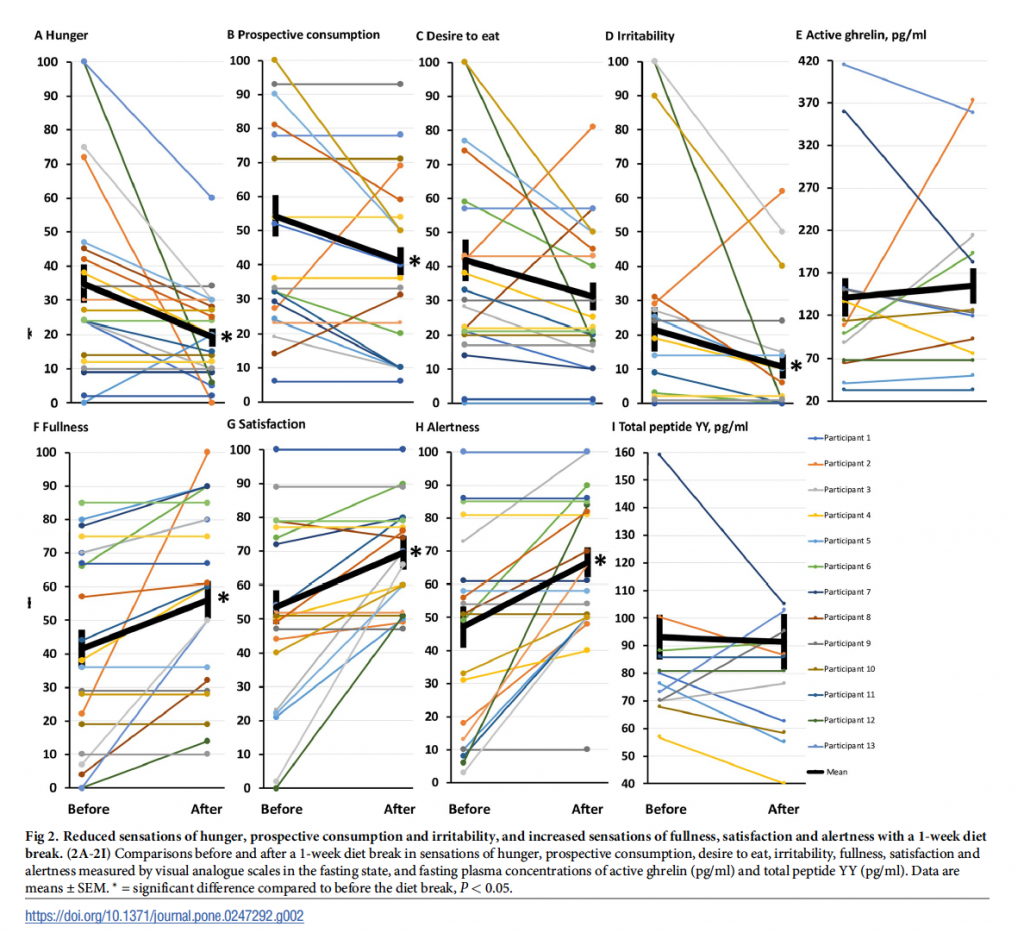
Limitations of using cheat meals/ refeeds
There are some key limitations to note on studies involving cheat meals and refeeds as discussed above. The main limitation is that muscle glycogen will be increased when increasing carbohydrate intake. This will cause an acute increase in body weight as well as reported lean body mass by various methods used to assess lean body mass (such as BIA or BIS). Therefore, does a refeed or a carbohydrate-rich cheat meal cause a direct increase in resting metabolic rate or is it an indirect consequence of an increase in muscle glycogen and body weight which has a higher energy cost during locomotion?
Moreover, many of the studies when administering a refeed do not do it above basal energy requirements other than Peos et al. (2021). Therefore, it is likely that the participants are still on a negative energy balance during the refeed and thus the resulting lower fat-free mass loss and higher fat mass loss compared to a continuous energy restriction group is likely to be due to a lower calorie deficit which helps maintain some markers of metabolism such as the thermic effect of feeding (TEF) and non-exercise active thermogenesis (NEAT).
Giving weight making athletes cheat meals or refeeds can potentially cause a binge eating episode. It is known that during weight making sports and physique sports that eating disorders are prevalent (Filaire et al. 2007). Providing cheat meals could cause a loss of control leading to frequent binge eating episodes, purging, and over-exercising to make up for the higher calorie intake.
Do we support the use of cheat meals?
We only support the use of cheat meals if we feel they are required. The most popular time when we have used them is if a fight has been pushed back by a few weeks during the training camp or if the athlete is reporting high feelings of hunger, irritability, lack of sleep and a lack of energy for training and day to day activities.
Moreover, when we use cheat meals, we advocate hard training sessions so that the carbohydrates and energy will be used efficiently. For example, during peak sparring or a HIIT session, this is due to past evidence showing that lower limb muscular endurance is enhanced following a carbohydrate refeed (Peos et al. 2021).
To date, the evidence is not totally convincing on cheat meals and our advice would be to ensure you are in a calorie deficit per week that aims to reduce body mass by 1% per week. Any higher and lean body mass loss is likely to happen which will subsequently reduce resting metabolic rate and increase feelings of hunger.
Lastly, we ensure our athletes are on a high carbohydrate diet as much as possible whilst still losing the required rate of body mass. This is to ensure they can maximise performance during high-intensity training sessions but also reduce illness risk. In addition, there is the potential that a higher carbohydrate diet and meals increase postprandial leptin concentrations compared to low carbohydrate high-fat meals (Romon et al. 1999) that could possibly reduce hunger and cravings.
References:
CAMPBELL, Bill I., et al. (2020). Intermittent energy restriction attenuates the loss of fat free mass in resistance trained individuals. A randomized controlled trial. Journal of functional morphology and kinesiology; J funct morphol kinesiol, 5 (1), 19-0.
DAVOODI, Sayed Hossein, et al. (2014). Calorie shifting diet versus calorie restriction diet: a comparative clinical trial study. International journal of preventive medicine; int J prev med, 5 (4), 447-456.
DIRLEWANGER, M., et al. (2000). Effects of short-term carbohydrate or fat overfeeding on energy expenditure and plasma leptin concentrations in healthy female subjects. International journal of obesity, 24 (11), 1413-1418.
ESCALANTE, Guillermo, CAMPBELL, Bill I. and NORTON, Layne (2020). Effectiveness of Diet Refeeds and Diet Breaks as a Precontest Strategy. Strength and conditioning journal, 42 (5), 102-107.
FILAIRE, Edith, et al. (2007). Eating attitudes, perfectionism and body-esteem of elite male judoists and cyclists. Journal of sports science & medicine; J sports sci med, 6 (1), 50-57.
FINN, KEVIN J., DOLGENER, FORREST A. and WILLIAMS, RICHARD B. (2004). EFFECTS OF CARBOHYDRATE REFEEDING ON PHYSIOLOGICAL RESPONSES AND PSYCHOLOGICAL AND PHYSICAL PERFORMANCE FOLLOWING ACUTE WEIGHT REDUCTION IN COLLEGIATE WRESTLERS. Journal of strength and conditioning research; J strength cond res, 18 (2), 328-333.
FRANCHINI, Emerson, BRITO, Ciro J. and ARTIOLI, Guilherme G. (2012). Weight loss in combat sports: Physiological, psychological and performance effects. Journal of the international society of sports nutrition; J int soc sports nutr, 9 (1), 52-52.
GIL-CAMPOS, Mercedes, et al. (2006). Ghrelin: a hormone regulating food intake and energy homeostasis. British journal of nutrition; br J nutr, 96 (2), 201-226.
HELMS, Eric R., ARAGON, Alan A. and FITSCHEN, Peter J. (2014). Evidence-based recommendations for natural bodybuilding contest preparation: Nutrition and supplementation. Journal of the international society of sports nutrition; J int soc sports nutr, 11 (1), 20-20.
LANGAN-EVANS, Carl, et al. (2020). The Psychological and Physiological Consequences of Low Energy Availability in a Male Combat Sport Athlete. Medicine and science in sports and exercise; med sci sports exerc, 53 (4), 673-683.
MOURA, Ronaldo Ferreira, et al. (2021). Carbohydrate refeed does not modify GVT-performance following energy restriction in bodybuilders. Clinical nutrition ESPEN, 43 , 308-316.
PEOS, Jackson J., et al. (2021). A 1-week diet break improves muscle endurance during an intermittent dieting regime in adult athletes: A pre-specified secondary analysis of the ICECAP trial. PloS one; PLoS one, 16 (2), e0247292-e0247292.
PEOS, Jackson James, et al. (2019). Intermittent Dieting: Theoretical Considerations for the Athlete. Sports (basel); sports (basel), 7 (1), 22.
PILA, Eva, et al. (2017). A thematic content analysis of #cheatmeal images on social media: Characterizing an emerging dietary trend. The international journal of eating disorders; int J eat disord, 50 (6), 698-706.
ROBERTS, Brandon M., et al. (2020). Nutritional Recommendations for Physique Athletes. Journal of human kinetics; J hum kinet, 71 (1), 79-108.
ROMON, M., et al. (1999). Leptin response to carbohydrate or fat meal and association with subsequent satiety and energy intake. American journal of physiology – endocrinology and metabolism, 277 (5), 855-861.
ROOYACKERS, O. E. and NAIR, K. S. (1997). Hormonal regulation of human muscle protein metabolism. Annual review of nutrition; annu rev nutr, 17 (1), 457-
